Originally, Daredevil was created by Stan Lee and Bill Everett in 1964 to be a darker, more grown-up version of the already popular Spider-Man; Marvel Comics’ attempt at a Batman-like hero (but with superpowers and minus the billion-dollar inheritance). The dominant thematic metaphor of Daredevil comics from the beginning was fear and fearlessness, with the character’s superhuman acrobatics and satanically-themed costume intending to give him an advantage by evoking fear in his enemies while he appears to have none – hence his being known as “The Man Without Fear” – just like Batman’s choice of costume and his attitude toward crimefighting is based on turning outward his own fears of crime and of bats to strike fear into the hearts of criminals instead who are, after all, a cowardly and superstitious lot.
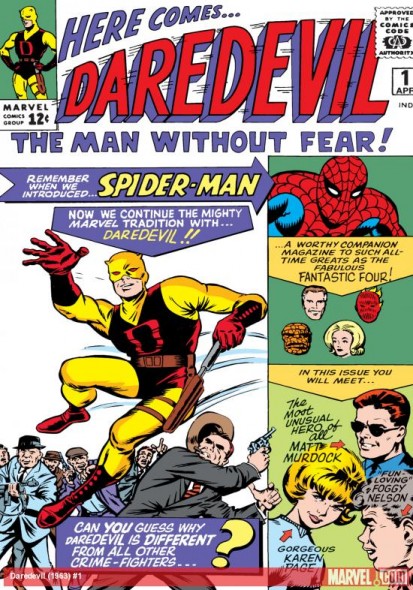
Is it his fashion sense?
Now, Daredevil has been my favourite mainstream superhero for a pretty long time, so you can imagine how excited I was when the new series was announced – and even happier after seeing how critics and audiences generally agree with me about how good the first season was (98% on Rotten Tomatoes!). After the well-meaning but gross disaster that was the 2003 Ben Affleck film adaptation, I was afraid that DD’s reputation would be trashed for good.
Creator/writer/producer Drew Goddard (writer on some of the best and most influential shows and movies ever (not to mention personal favourites of mine), like Buffy the Vampire Slayer; Lost; Cabin in the Woods) knows that most good adaptations are about synthesis, so along with fairly traditional takes on essential characters like Matt Murdock/Daredevil, Franklin “Foggy” Nelson, Karen Page, and Stick, the show also includes reimagined, more realistic versions of DD friends and enemies Ben Urich, Leland Owlsley, Melvin Potter, Claire Temple/Night Nurse, as well as a wonderful and unexpectedly sensitive portrayal of Wilson Fisk by Vincent D’Onofrio. Goddard merged elements from throughout Daredevil’s history to craft something compelling and new while staying true to the character’s roots.
One thing, though: Netflix’s Disney’s Marvel’s Daredevil isn’t about fear, the way that the comics always were. It’s actually about pain; more precisely, it’s about the meaning of pain and the moral utility of causing others to suffer as well as experiencing suffering oneself.
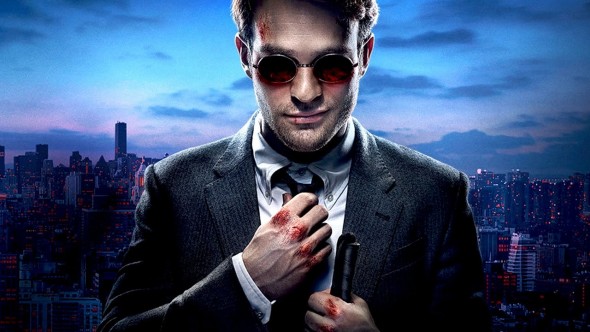
That blood really brings out your eyes.
Over the season’s thirteen episodes, parallels and contrasts are (of course) drawn between Murdock/Daredevil and Fisk/Kingpin. Both want to “save” Hell’s Kitchen, which both consider their city – to the exclusion of the other. Fisk uses his financial and political influence to control the neighbourhood’s residential and commercial properties and eject or refuse any “undesirables,” (which, to Fisk, pretty much just means “poor people”) in the interest of hastening the city’s rebuilding after the destruction wreaked in the first Avengers movie. This includes criminal tactics and he’s not above hurting or killing people for what he sees as the greater good.
Murdock, on the other hand, goes around at night in a mask beating people up – sometimes very badly. He hasn’t killed anybody, but the people he beats up are criminals, of course, who have done terrible things to innocents who didn’t deserve it. He inflicts pain to get information, convince the punks to go straight, and so on. Fisk inflicts pain on the innocent while Murdock inflicts it on the guilty – which is why Murdock is the hero and Fisk the villain. But there’s one other thing that differentiates Murdock’s infliction of pain from Fisk’s, something besides their targets.
Fisk repeatedly assures us that he doesn’t enjoy it. He takes no pleasure from the pain that he causes. It’s purely utilitarian, a means to an end. This is how he convinces himself that he’s a good guy – he hurts people, sure, but it’s just part of his job. Murdock, on the other hand, tells us that he does enjoy it. He likes beating the crap out of people. It isn’t just a job to him, the way it is to Fisk. To Daredevil, inflicting pain is fun.
Murdock feels bad about enjoying the suffering of others, both because his father (a boxer, ironically) taught him to be a pacifist as well as a result of his Catholic faith that ostensibly teaches him to love his enemy and turn the other cheek. In a fascinating and innovative subversion of the usual good guy/bad guy tropes, Drew Goddard has given us a hero and villain whose moral architecture is a lot more complex than it appears on the surface. Fisk, the villain, endorses a form of moral utilitarianism – he agrees that, in general, hurting and killing people is bad, but the good that he’s trying to achieve outweighs that because he’s not inflicting that pain for his own personal satisfaction; Murdock, the hero, on the other hand, subscribes to a kind of moral sadism, where inflicting pain and having pain inflicted can in and of itself have legitimate moral purpose and value regardless of any greater purpose mitigating the presumed ethical violation of causing someone pain.
Abusing utilitarianism is a familiar trope for supervillains (and just regular, real-life villains), but Daredevil’s moral sadism is something that we don’t see as often. Other heroes (or, more often, anti-heroes) who enjoy causing pain and destruction almost always do so when they’re in some kind of uncontrollable fugue state (Wolverine; Hulk), or are characters who are mentally unstable generally (Deadpool). Matt Murdoch feels bad about his enjoyment of other people’s suffering; he all but reveals his secret identity to a local priest who hears his confessions. Murdock is sure that he’s on the side of the angels, but at the same time he worries that he’s got the devil in him precisely because he thinks he should be more of a utilitarian like Fisk. Feeling good about other people’s pain is a bad thing, right?
But Daredevil isn’t interested in inflicting pain on just anybody for the sheer joy of it. He derives his pleasure from being an implement of justice, from causing pain to those who deserve it. This kind of moral sadism is actually a surprisingly justifiable position, reconciling two seemingly opposite philosophical directions that have their synthesis in Daredevil’s character – while the ideas of the Marquis de Sade himself (from whom we get the word sadism, of course) were radically anti-theistic and anti-Catholic in particular, in the sense that his rejection of church doctrine shaped the nature of the philosophy he formulated against it, it couldn’t help but be influenced precisely by what it was trying to destroy. And Daredevil is a very Catholic character – not exactly devout, but formed by his Catholic upbringing to have a certain concept of the world and his responsibilities in it.
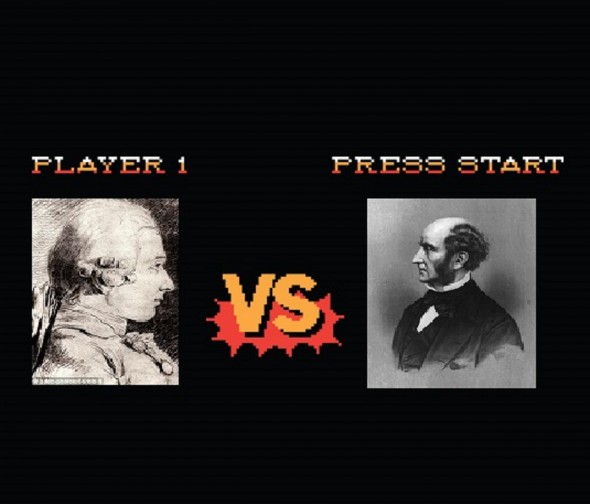
I’m giving two-to-one odds for the guy with no regard for the sanctity of human life.
The Marquis de Sade lived through the French Revolution, when all kinds of conventional ideas about the State and its citizens, the boundaries of freedom, and the use of force were being upended and overturned. Sade believed that an ideal government would have as little influence over the lives of its citizens as possible, even to the point of abdicating responsibility for the punishment of criminals. He insists that those who are vested with the legal authority to punish others are inevitably (maybe inherently) morally inferior to the criminals that they’re tasked with punishing. The State, according to Sade, is more or less just the outsourcing of a population’s lust for revenge to a designated set of individuals who are empowered to carry it out, that the State consists almost exclusively in its capacity to inflict pain. This idea anticipated Max Weber’s later formulation of the State as a group that manages to convince the population of a given geographical territory that it (the group) has a monopoly on the legitimate use of violence – to enforce its laws, defend its territory against invaders, and so on. The French Revolution itself bears out Sade’s beliefs about power – the very first thing that the people did after wresting power from the monarchy was to turn around and decapitate not just the royals who had oppressed them, but anybody they thought were insufficiently revolutionary (which turned out to be tens of thousands of people).
Sade doesn’t think that the State should hold this power; as a matter of fact, he prefers the kind of non-legitimated violence that individuals who “take the law into their own hands” dole out instead. A government that has the power to punish also has the motivation to punish precisely to hold on to that power; conversely, in a society where there are no government-enforced repercussions, personal vengeance becomes a major concern for anyone considering harming their fellow citizens. You know that if you decide to flip out and murder somebody, there’s a good chance you can get away with it if, say, the authorities are sufficiently incompetent or corrupt, or even if you’ve got a good enough lawyer. But if your potential victim’s family or friends are free to exact retribution without any need for the kind of proof that a court would require, that’s supposed to be sufficient enough disincentive to stop the would-be murderers out there without piling on the additional evils that go along with government-imposed legal and social structures.
In Daredevil’s case, Sade’s idea that the State is really worse than the criminals it punishes is largely true: Fisk has half the police force and a number of government officials in his pocket. Murdock works within the system by day as a lawyer, but at night he gives himself permission to use violence against whoever he thinks has earned it; if the State is failing in its role as the people’s vicarious avenger, then he will have to be their public defender (yeah, pun, sorry). This is also where Murdock’s Catholic-formed ethics run up against Sade’s Catholic-rejecting ethics: Murdock sees his enjoyment of punishing criminals as negative, an indication that there’s something wrong with him, which causes him to question his own role as hero (conversely, that Fisk fails to derive any pleasure from the pain he inflicts is enough to convince him that he’s doing the right thing).
But actually, inflicting and experiencing pain in response to prohibited behaviours is something that comes right out of Murdock’s Catholic upbringing.
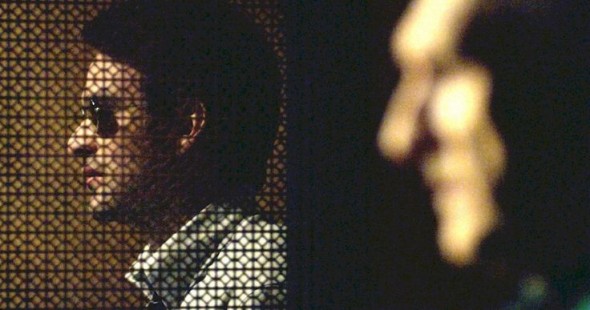
Do you believe in the devil, Father?
The Catholic Church has a long history of using physical punishment as a disciplinary tool. To the extent that the Church was the State, it was within its rights to enforce its laws on the people and to mete out punishments as it saw fit. The Church frequently used corporal punishment to keep schoolchildren in line, but also administered brutal public floggings to criminals – and the purpose of these were twofold: first, they were intended to serve as a deterrent. Witnesses to the event would be scared of the possibility of being punished and would avoid committing whatever sin or crime themselves (although Sade would say that rather than being any sort of deterrent, the public spectacles were just an excuse for people to enjoy the suffering and humiliation of their fellow citizens).
Daredevil provides the same service. As “the devil of Hell’s Kitchen,” he earns a reputation as a masked vigilante who inflicts severe beatings. His enemies, of course, take the opportunity to imply that some of their crimes are in fact his, so the regular person on the street isn’t sure whether he’s a good guy or a bad guy – but, to be fair, sometimes neither is he. That said, the criminals he punishes as well as the ones who want to avoid a beating at the devil’s hands certainly do have a strong disincentive now that Daredevil is on the prowl.
Second, there’s the theory of the redemptive suffering. Inflicting this pain on sinners was also a means of “forcing forgiveness” on them, in a certain way. Their sins are “repaid” in the form of pain, and their souls are cleansed of the crimes they committed in the past. Daredevil’s actions work on this level too: it’s not just that the people he hurts are encouraged to give up information and disinclined to commit more crimes for fear of future beatings or worse, but the suffering that they experience is a kind of enforced penance that leaves them with a cleaner slate than before (if they accept it and stop their bad behaviour in the future, of course). Much of the time, just the beatdown is enough, as far as Daredevil is concerned; he lets the person go after that, feeling that they have been sufficiently chastised. In that sense, Daredevil is doing these people a favour. He’s helping them have their sins forgiven (just as the Church believed they were doing) – so why shouldn’t he feel good about that? It’s something that ought to be enjoyed, isn’t it? Seen this way, Daredevil has the best reason in the world for his moral sadism; he’s not only saving the innocent citizens of Hell’s Kitchen, he’s even saving the criminals! Fisk doesn’t feel good about the things he has to do because the pain he causes is a regrettable tool for accomplishing his goals; but for Daredevil, the pain isn’t only a means to an end (though it is also that) – it’s also an end in itself, to the extent that the pain has moral value even apart from its primarily inquisitional or reformative effects.
One more thing. Murdock doesn’t just enjoy inflicting pain on others – he also kind of enjoys experiencing pain himself. He feels guilty about what he does, even though he thinks it’s right, and sees the agonies and injuries he sustains in fights as his just desserts for taking the law into his own hands – even if that is his moral obligation. For nearly the entire season, Daredevil fights in not much more than a black sweatsuit; he only acquires his armoured superhero getup when it’s pointed out to him that he’s likely to get himself killed without some better protection. Murdock hasn’t killed anyone (though he’s considered it), and so he doesn’t feel that he deserves to be killed. But he has caused a whole lot of pain. To terrible people, certainly. But he’s not sure that makes it okay. By his willingness to suffer himself, Daredevil justifies the brutality that he dispenses to others. It all averages out. Which makes it okay. He isn’t only a moral sadist, but also a moral masochist. And this, of course, also has precedent in Catholic doctrine.
Mortification of the flesh is a longstanding concept in Catholicism (and many other religions), where the faithful subject themselves to pain and suffering as a means of self-sanctification. This can be anything from wearing an uncomfortable hairshirt; self-flagellation with whips, chains, or more exotic implements; and even self-crucifixion. Daredevil doesn’t deliberately self-harm, of course, but he does put himself in some potentially very painful situations; and rather than resent the pain, he accepts it – and goes beyond accepting it, as when he instructs Claire Temple to sew his stab wound closed. Murdock’s fight scenes are far less balletic and antiseptic as comparable battles in, say, Avengers. The camera lingers on Murdock’s injuries and keeps piling them on, one atop another. Lacerations, broken ribs, concussions, you name it. Though the scale and stakes in the more high-powered superhero fights are far greater than in Daredevil’s street-level brawls, ironically the physical consequences are much more sharply and personally felt by the audience in Daredevil – Avengers fights are obviously stage combat, but Daredevil fights are that one UFC match where the guy’s leg got bent the wrong way.
https://www.youtube.com/watch?v=G4TJWBT77uA
Not the UFC fight, don’t worry.
They even hurt to watch, is the point. Which is very deliberate on the filmmakers’ part. Daredevil isn’t an indestructible god like Thor, a supersoldier like Captain America, or encased in metal like Iron Man – but neither does he wear those heroes’ moral armour. Daredevil is a man without fear, and that includes a fearlessness when it comes to pain and suffering; but he’s not immune to the moral consequences of what he does. Where the predominant theme of the Avengers movies (and to a lesser extent those heroes’ individual movies as well) is duty and authority and how they sometimes conflict, Daredevil is concerned, literally and figuratively, with more earthly and familiar (and therefore more relatable) ideas: what’s worth hurting for?
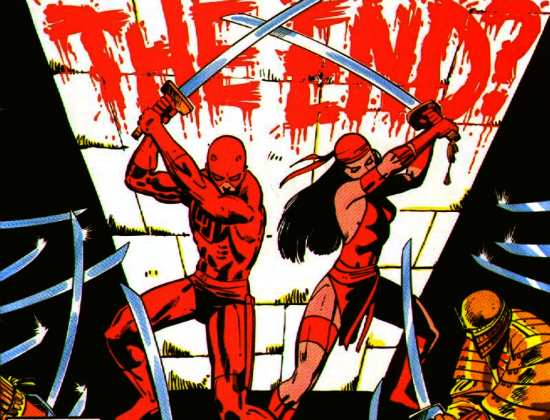
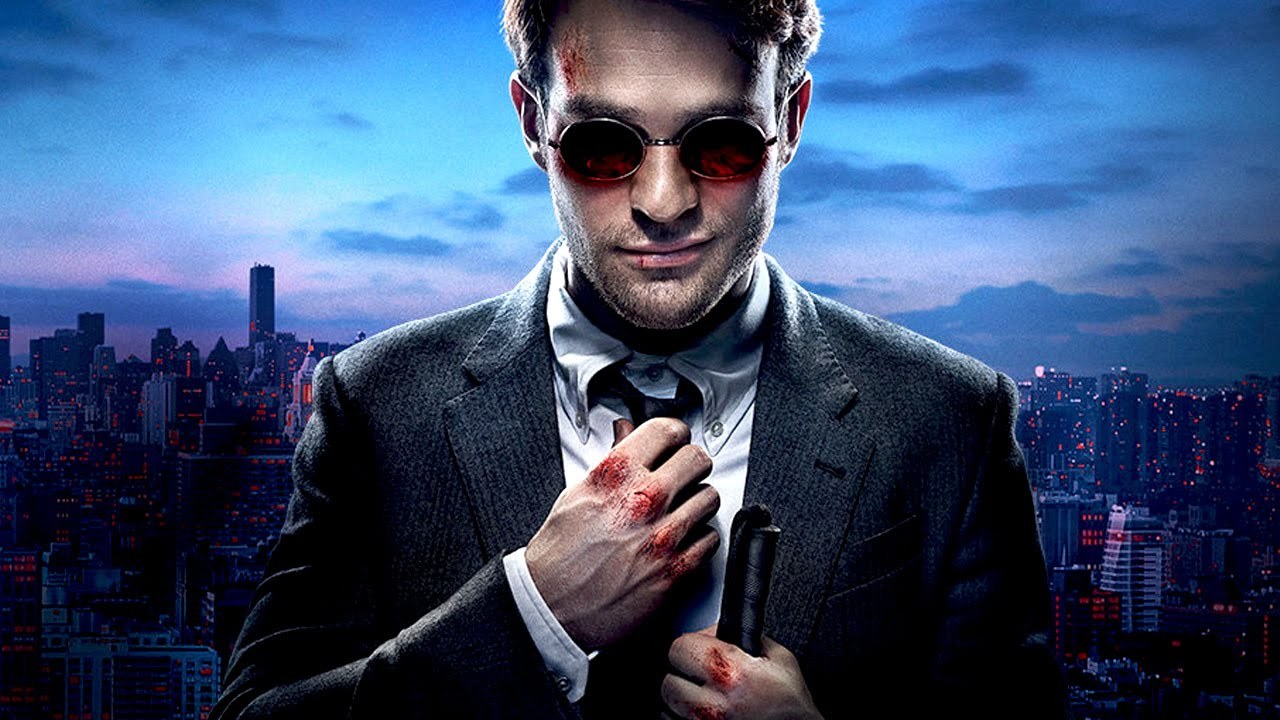
Really interesting article. The Daredevil series really got me thinking and feeling in a way that the Avengers didn’t. I think your argument could perhaps be extended a bit past the fourth wall, as well. I found it hard to watch much of the fighting and the patching up, because it was so intense. Because Matt suffered so much himself, though, it seemed to make the beating up of others much more justifiable and kept me going in the series when I might otherwise have quit watching because of the intensity of the violence and the squickiness of some of the gore.
Great article, Richard! What would be interesting is a comparative study between Daredevil and Dexter, since both seem linked by their sadism.
Not entirely matchy-matchy with the moral sadism angle, but I can’t believe you went into it without discussing Kant’s retributive theory of justice, particularly as practiced by Rorschach from Watchmen.
http://www.academia.edu/265817/Can_We_Steer_This_Rudderless_World_Kant_Rorschach_Retributivism_and_Honor
Matt Murdock aka Daredevil is fucking sadist. Who are you kidding? Just because his victims are bad guys doesn’t excuse the unnecessary violence he used to “get information”. I just re-watched “The Defenders” and the manner in which he tortured one of the Hand’s leaders, Sowande, to “get information”. The torture was unnecessary and Matt enjoyed it. Fuck him and fuck “Daredevil”. I’m sick and tired of people putting that damn on a pedestal.